Added: Oct. 13, 2008
Source: YouTube
The man who trades freedom for security does not deserve nor will he ever receive either. – Benjamin Franklin
Added: Oct. 13, 2008
Source: YouTube
“There is a global meltdown coming. It is a global depression. And one world currency and one world financial system is the endgame… China said last week they want one global currency. France said yesterday they want one world order – a ‘New World Order’ at the end of this event.”
Added: Oct. 09, 2008
Source: YouTube
Stock markets across the world are in a state of hysteria. The tidal wave of sell-offs, which began when Henry Paulson announced the Bush administration’s $700 billion bailout plan for the sinking banking system, has swelled into a global tsunami racing round the globe.
Shares fell sharply across Europe and Asia for the fifth straight day following a 679 drop on the Dow Jones. Nearly $900 billion was wiped off the value of U.S. equities in just one trading day. The Chicago Board Options Exchange Volatility Index, the “fear index”, soared to a record 64.
Credit markets remain frozen. Libor, the London interbank offered rate, nudged up slightly on Thursday night, signaling even greater resistance to lending between the banks. Until there is relief in the credit markets, stocks will continue to slide. But trust has vanished. The 50 basis points rate cut that was coordinated with foreign central banks has had no effect. The market is being driven by fear and pessimism.
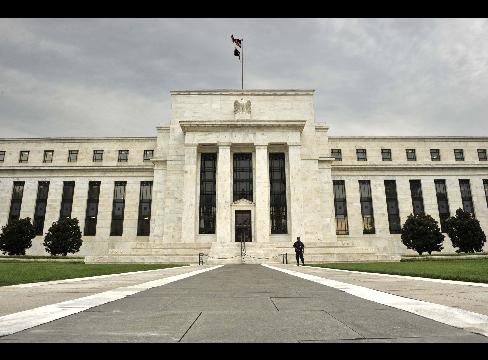
A security officer stands outside of the Federal Reserve building in Washington on Sept. 16, 2008. Photographer: Jay Mallin/Bloomberg News
Oct. 8 (Bloomberg) — The Federal Reserve, European Central Bank and four other central banks lowered interest rates in an unprecedented coordinated effort to ease the economic effects of the worst financial crisis since the Great Depression.
The Fed, ECB, Bank of England, Bank of Canada and Sweden’s Riksbank each cut their benchmark rates by half a percentage point. The Bank of Japan, which didn’t participate in the move, said it supported the action. Switzerland also took part. Separately, China’s central bank lowered its key one-year lending rate by 0.27 percentage point.
Today’s decision follows a global meltdown that sent U.S. stock indexes heading for their biggest annual decline since 1937; Japan’s benchmark today had the worst drop in two decades. Policy makers are also aiming to unfreeze credit markets after the premium on the three-month London interbank offered rate over the Fed’s main rate doubled in two weeks to a record.
Read moreFed, ECB, Central Banks Cut Rates in Coordinated Move
Ron Paul on Fox Business
Source: YouTube
Source: YouTube
Wednesday, September 24, 2008
Dear Friends,
Whenever a Great Bipartisan Consensus is announced, and a compliant media assures everyone that the wondrous actions of our wise leaders are being taken for our own good, you can know with absolute certainty that disaster is about to strike.
The events of the past week are no exception.
The bailout package that is about to be rammed down Congress’ throat is not just economically foolish. It is downright sinister. It makes a mockery of our Constitution, which our leaders should never again bother pretending is still in effect. It promises the American people a never-ending nightmare of ever-greater debt liabilities they will have to shoulder. Two weeks ago, financial analyst Jim Rogers said the bailout of Fannie Mae and Freddie Mac made America more communist than China! “This is welfare for the rich,” he said. “This is socialism for the rich. It’s bailing out the financiers, the banks, the Wall Streeters.”
That describes the current bailout package to a T. And we’re being told it’s unavoidable.
The claim that the market caused all this is so staggeringly foolish that only politicians and the media could pretend to believe it. But that has become the conventional wisdom, with the desired result that those responsible for the credit bubble and its predictable consequences – predictable, that is, to those who understand sound, Austrian economics – are being let off the hook. The Federal Reserve System is actually positioning itself as the savior, rather than the culprit, in this mess!
There goes your country.
Even some so-called free-market economists are calling all this “sadly necessary.” Sad, yes. Necessary? Don’t make me laugh.
Our one-party system is complicit in yet another crime against the American people. The two major party candidates for president themselves initially indicated their strong support for bailouts of this kind – another example of the big choice we’re supposedly presented with this November: yes or yes. Now, with a backlash brewing, they’re not quite sure what their views are. A sad display, really.
Although the present bailout package is almost certainly not the end of the political atrocities we’ll witness in connection with the crisis, time is short. Congress may vote as soon as tomorrow. With a Rasmussen poll finding support for the bailout at an anemic seven percent, some members of Congress are afraid to vote for it. Call them! Let them hear from you! Tell them you will never vote for anyone who supports this atrocity.
The issue boils down to this: do we care about freedom? Do we care about responsibility and accountability? Do we care that our government and media have been bought and paid for? Do we care that average Americans are about to be looted in order to subsidize the fattest of cats on Wall Street and in government? Do we care?
When the chips are down, will we stand up and fight, even if it means standing up against every stripe of fashionable opinion in politics and the media?
Times like these have a way of telling us what kind of a people we are, and what kind of country we shall be.
In liberty,
Ron Paul
By Ron Paul
Special to CNN

Rep. Ron Paul says the government’s solution to the crisis is the same as the cause of it — too much government.
![]()
(CNN) — Many Americans today are asking themselves how the economy got to be in such a bad spot.
For years they thought the economy was booming, growth was up, job numbers and productivity were increasing. Yet now we find ourselves in what is shaping up to be one of the most severe economic downturns since the Great Depression.
Unfortunately, the government’s preferred solution to the crisis is the very thing that got us into this mess in the first place: government intervention.
Read moreRon Paul: Bailouts will lead to rough economic ride
Sept. 21 (Bloomberg) — The Bush administration sought unchecked power from Congress to buy $700 billion in bad mortgage investments from financial companies in what would be an unprecedented government intrusion into the markets.
Through his plan, Treasury Secretary Henry Paulson aims to avert a credit freeze that would bring the financial system and the world’s largest economy to a standstill. The bill would prevent courts from reviewing actions taken under its authority.
“He’s asking for a huge amount of power,” said Nouriel Roubini, an economist at New York University. “He’s saying, `Trust me, I’m going to do it right if you give me absolute control.’ This is not a monarchy.”
Read moreTreasury Seeks Asset-Buying Power Unchecked by Courts!
Bailout proposal sent to Congress seeks authorization to spend as much as $700 billion to buy troubled mortgage-related assets.
NEW YORK (CNNMoney.com) — President Bush has asked Congress for the authority to spend as much as $700 billion to purchase troubled mortgage assets and contain the financial crisis.
The legislative proposal – the centerpiece of what would be the most sweeping economic intervention by the government since the Great Depression – was sent by the White House overnight to lawmakers.
Paulson, Bernanke, and Congress are conspiring to make the US taxpayer the fall guy for financial stupidity by banks and brokers. Congress is now willing to ram through legislation at the last moment, even though Senate Majority Leader Reid Says “No One Knows What to Do”.
Please consider Paulson, Bernanke Push New Proposal to Cleanse Balance Sheets (at taxpayer expense).
U.S. Treasury Secretary Henry Paulson and Federal Reserve Chairman Ben S. Bernanke proposed moving troubled assets from the balance sheets of American financial companies into a new institution.
Congressional leaders who met with Paulson and Bernanke late yesterday in Washington said they aim to pass legislation soon. The initiative, which may also insure money-market funds, is aimed at removing the devalued mortgage-linked assets at the root of the worst credit crisis since the Great Depression.
Eight years ago, Yale superstar professor and MacroMarkets chief economist Robert Shiller famously called the top of the stock market in his book Irrational Exuberance. Then, a year before the housing bubble peaked, he predicted the colossal bust we are now experiencing.
If you recognize Shiller’s name, it’s because the Standard & Poor’s/Case-Shiller home price indexes, which he developed with Wellesley College economist Karl Case, have become the nation’s most authoritative source for home price trends.
In part one of my one-on-one with Shiller, we discuss the grim outlook for U.S. housing, which he tackles in-depth in his new book The Subprime Solution. Highlights of our first discussion include:
Read moreU.S. House Price Decline Could Be Worse than Great Depression, Economist Shiller Says
DON’T CRY FOR ME ARGENTINA SAVE YOUR TEARS FOR YOURSELF – While bankers do control the issuance of credit, they cannot control themselves. Bankers are the fatal flaw in their deviously opaque system that has substituted credit for money and debt for savings. The bankers have spread their credit-based system across the world by catering to basic human needs and ambition and greed; and while human needs can be satisfied, ambition and greed cannot-and the bankers’ least of all.
I have a bad feeling about what’s about to happen. The Great Depression is the closest that comes to mind. I, like most, was not alive during the 1930s when it happened. Nonetheless, what once was feared in private is now being discussed in public. It’s going to be bad. It’s going to make high school seem like fun.
THE UNITED STATES OF AMERICA THE NEXT ARGENTINA
This Time is Different: A Panoramic View of Eight Centuries of Financial Crises by University of Maryland‘s Carmen Reinhart and Harvard’s Kenneth Rogoff makes for perfect reading when flying between the US and Argentina.
There is perhaps no better analysis than Reinhart and Rogoff’s on the history of sovereign defaults; and, as such, Reinhart and Rogoff’s paper was ideal reading material when traveling between the US and Argentina , for the sovereign defaults that happened in the past to Argentina will soon be happening to the US .
ATLANTA – The Federal Deposit Insurance Corp. is one of those agencies with a low profile but essential role similar to plumbing or electricity – you don’t notice it until the power’s out or the basement’s flooding.
These days, the FDIC’s folks are busier with the financial equivalent of fixing burst water mains and dead power lines.
Seventy-five years after it was launched during the Great Depression, the bank regulator and insurer is facing its biggest challenge in decades. Many banks in Georgia and across the nation have been battered by the slumping economy and troubled loans to home builders, developers and homeowners.
Hundreds could fail, some industry experts predict. That could force the agency to make good on its promise to insure most customers’ checking and savings deposits up to $100,000 and some retirement accounts up to $250,000, putting pressure on its insurance fund.
Ready for a little shock? Link
A reader has discovered this on Digg: “This is how fucked we are”
That says it all.
Related article: Stressed banks borrow record amount from Fed
What does it mean if you have such a huge “shortage of liquidity in your system”?
Hmmmhhh?!? Oh! Run, run, run.
According to the FDIC I am just another blogger creating fear in the marketplace, so don’ t worry.
You can trust the government on this:
WASHINGTON, July 22 (Xinhua)
U.S. Treasury Secretary Henry Paulson said Tuesday that the U.S. banking system is sound and the long-term fundamentals of economy are strong.
December 5, 1929
“The Government’s business is in sound condition.” — Andrew W. Mellon, Secretary of the Treasury
More Quotes from the Great Depression:
Read moreBorrowings of Depository Institutions from the Federal Reserve
September 1929
“There is no cause to worry. The high tide of prosperity will continue.” — Andrew W. Mellon, Secretary of the Treasury.
October 14, 1929
“Secretary Lamont and officials of the Commerce Department today denied rumors that a severe depression in business and industrial activity was impending, which had been based on a mistaken interpretation of a review of industrial and credit conditions issued earlier in the day by the Federal Reserve Board.” — New York Times
December 5, 1929
“The Government’s business is in sound condition.” — Andrew W. Mellon, Secretary of the Treasury
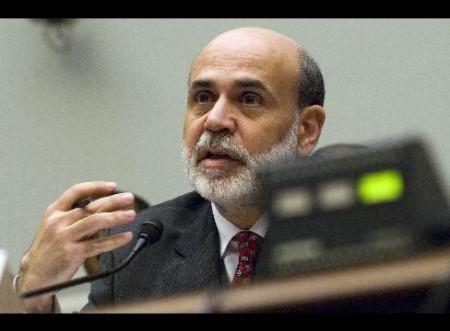
July 21 (Bloomberg) — Ben S. Bernanke and Henry Paulson are under pressure to embrace the big-government policies of America in the 1930s, or Sweden in the 1990s, to contain the conflagration engulfing the U.S. housing and financial markets.
Among the ideas: Using taxpayer money to shore up the capital of loss-ridden Fannie Mae and Freddie Mac, setting up new agencies to buy and refinance mortgages in default, even taking over failing financial institutions.
The government’s current “fire-brigade approach to dealing with the fallout from the extremely weak domestic economy is eroding general confidence in the U.S. financial system,” says Brian Bethune, chief U.S. financial economist at Lexington, Massachusetts-based Global Insight. “Bold, creative, aggressive policy action is needed.”
Read moreBernanke, Paulson Pressed to Seek Big-Government Bank Bailout
Today I am celebrating my 80th birthday, an age that seems less formidable when one has reached it than when one can see it only from afar.
I was born on July 14, 1928, about 15 months before the American boom of the 1920s came to its rather abrupt end. Like everyone else, I am naturally curious to see whether the global credit crunch is going to be a brief interruption in global prosperity, or the prelude to a longer and deeper depression.
I cannot claim to have clear memories of the 1929 Wall Street Crash, which occured when I was 1year old, or of Britain leaving the gold standard in 1931, when I was 3 years old.
I do however, remember newspaper articles about the later stages of the Depression. In the 1930s, my parents read The Times, the Financial Times and the Daily Mail.
Related articles and videos:
– More Than 300 US Banks to Fail, Says RBC Capital Markets Analyst
– Run on banks spells big trouble for US Treasury
– US: Total Crash of the Entire Financial System Expected, Say Experts
– The Dollar is doomed and the Fed will fail
– Fannie, Freddie insolvent, Poole tells Bloomberg
– Foreclosures Rose 53% in June, Bank Seizures Triple
– Small Banks: Billions in Troubled Construction Loans
– Financial market losses could top 1,600 billion dollars: report
– Dow suffers worst 1st half since ‘70
– Fortis Bank Predicts US Financial Market Meltdown Within Weeks
– Barclays warns of a financial storm as Federal Reserve’s credibility crumbles
– Jim Rogers: Avoid The Dollar At All Costs
– Ron Paul on Iran and Energy June 26, 2008
– Marc Faber: ‘Misleading’ Fed Should Let Banks Fail
I can remember the news stories of the Jarrow march of the unemployed. I also remember discussing with my mother a lead story which reported that farm workers’ pay was to be raised 6d (2p) to what would now be £1.50 a week. The depression was a fact of existence in the North Somerset coalfield up to the outbreak of war in 1939.
Fortunately, there has only been one Great Depression in my lifetime, but there has also been a Great Inflation. In 2006 Pickering and Chatto, which I refounded in the 1980s, had the good timing to publish a three-volume History of Financial Disasters, under the general editorship of Mark Duckenfield.
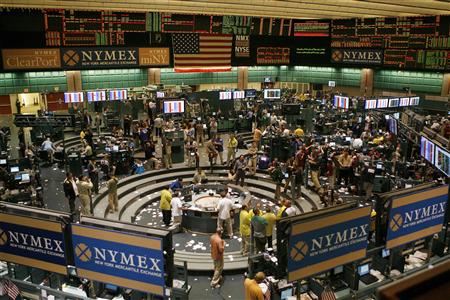
Investors are fleeing from the U.S. stock market, Sending the Dow to Worst June Since Depression, looking for places to secure their wealth.
There is an unprecedented cash flow of ‘hot money’, which is usually defined as short-term global speculative funds moving among financial markets in search of the highest short-term return, moving into China:
Is China flooded with ‘hot money’ because of an expected meltdown in the U.S.?
– Fortis Bank Predicts US Financial Market Meltdown Within Weeks
We have seen the Dow suffering it’s worst 1st half since ‘70 accompanied by a lot of bad news for the economy like:
– US: Big Trouble for General Motors, Crysler and Ford
– America’s Aviation System About To Collapse
– Starbucks to cut as many as 12,000 positions
And now the corporations are cheating you at the supermarkets: America’s Shrinking Groceries
The Dollar is being destroyed by the Federal Reserve, which has created in the last three years 4 Trillion Dollars of new money out of thin air: Ron Paul on Iran and Energy June 26, 2008
Ron Paul is further warning that: This coming crisis is bigger than the world has ever experienced
and that: We are at the beginning of a huge Dollar bubble.
The US Federal Reserve intentionally created inflation and that is why its credibility has fallen “below zero” and that is why Barclays warns of a financial storm as Federal Reserve’s credibility crumbles.
More dire warnings:
– RBS issues global stock and credit crash alert
– Morgan Stanley warns of ‘catastrophic event’ as ECB fights Federal Reserve
– Central bank body warns of Great Depression
– Credit crisis expands, hitting all kinds of consumer loans
– How Low Can The Dollar Go? Zero Value
Investors like Jim Rogers are telling us to “Avoid The Dollar At All Costs” and have told us that the Federal Reserve will fail and that Bernanke should be fired (alhough that isn’t possible because of his contract), because he has created the worst recession in the end and thats why he said: “Abolish the FED” on CNBC 2008.03.12.
The Fed is only doing good for the big corporations on Wall Street. If you would continuously come close to bankruptcy, because you have irresponsibly wasted your money, who will continuously give you billions of Dollars and bail you out, because you might fail? So I agree totally with Marc Faber: ‘Misleading’ Fed Should Let Banks Fail.
Well those corporations are said to be to “Big to Fail”, but they eventually will fail, because the entire system will fail and the Dollar is being destroyed in the process and so the people will end up with nothing, because their life savings are worthless paper. You are already paying the price for this policy, but maybe you haven’t looked at it that way:
The Price Of Food: 2007 – 2008
What inflation really is, is a taxation on monetary assets. And guess who is paying for all of that?
I just love this video. A must see:
The Stock Market and the Monetary System are on the verge of collapse!
Read moreUS: Total Crash of the Entire Financial System Expected, Say Experts
Until now, I have given equal credence to two possible scenarios:
So what caused me to settle on number two?
I received John Williams’ recent newsletter “Shadow Government Statistics,” www.shadowstats.com in which he describes his case for a hyper-inflationary depression. It was most persuasive. It certainly persuaded me, and is consistent with what I’ve said for years.
I spent the ’70s fending off the media label of “Prophet of Doom,” arguing that I expected much less than doom. It turned out to be so.
With my new book in circulation, I’ll face the same accusations, and this time they are right. The financial world we know and love is facing genuine doom. You could lose the value of all your assets in the stock market. You could find yourself unable to buy essential commodities, when you want them, and gold and silver will be valued, not in the tens or hundreds of dollars per ounce, but in the thousands!
John Williams’ Shadow Government Statistics newsletter is most unusual. John is a consulting economist with all of the academic credentials. Most of his clients are bank officers and high-ranking corporate officers. He has rearranged the government data according to historical analysis.
For example, the government says inflation is under four percent by the simple expedient of eliminating energy and food from their calculations. John says inflation is over 11 percent, including energy and food.
His academic credentials are way ahead of mine, but at least I know enough to understand his work. It’s my job to try to reduce such things to terms my subscribers can grasp.
Here are some brief paragraphs from this 25-page report.
“With the creation of massive amounts of new fiat (not backed by gold) dollars will come the eventual complete collapse of the value of the U.S. dollar and related dollar-denominated paper assets.”
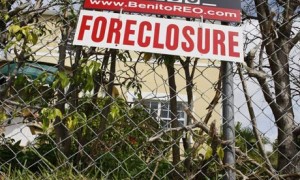
America’s mortgage crisis has spiralled into “the largest financial shock since the Great Depression” and there is now a one-in-four chance of a full-blown global recession over the next 12 months, the International Monetary Fund warned today.
Read moreIMF says US crisis is ‘largest financial shock since Great Depression’
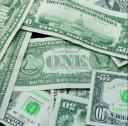
The corporate controlled media is finally starting to talk about the economic problems that the alternative media and assorted precious metals advocates have been talking about for years now. We are facing a potential inflationary depression. Independent estimates of the M3 money supply show that we are seeing an annual increase in the M3 money supply by around 16 to 17 percent. The Federal Reserve chose to stop producing this report right around the time when these figures began going parabolic on their chart showing a massive increase in the money supply. An increase in the money supply results in a devalued currency and that’s one of the primary reasons why we are seeing the price of gold flirt with the $1,000 an ounce mark and silver explode past the $20 an ounce mark. The U.S. Dollar Index is now treading water around the 72 to 73 mark and it is becoming increasingly clear that the role of the world’s reserve currency is shifting from the U.S. Dollar to the Euro. Some ask how low the U.S. Dollar could go and that answer is simple. The U.S. Dollar could go to zero because it is a fiat currency with no real tangible backing. Every fiat currency in the history of man has been replaced or collapsed and there is nothing fundamentally different between the U.S. Dollar and these other fiat monetary systems of the past.